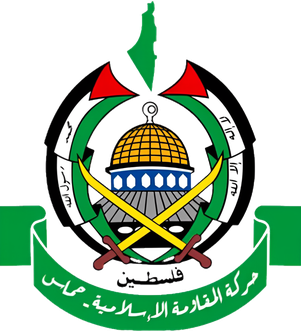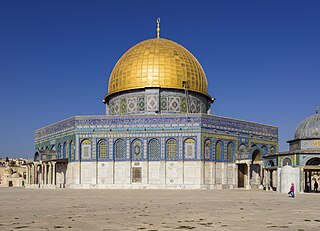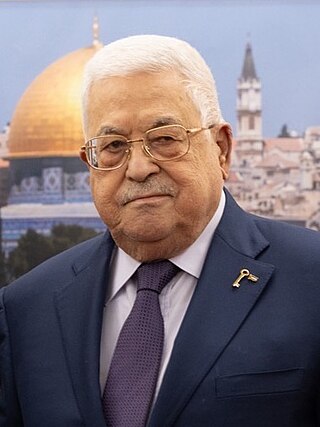Related Research Articles

Hamas, an acronym of its official name, Harakat al-Muqawama al-Islamiya, is a Palestinian Sunni Islamist political and military movement governing the Israeli-occupied Gaza Strip since 2007.

The Palestinian Authority, officially known as the Palestinian National Authority or the State of Palestine, is the Fatah-controlled government body that exercises partial civil control over West Bank areas "A" and "B" as a consequence of the 1993–1995 Oslo Accords. The Palestinian Authority controlled the Gaza Strip prior to the Palestinian elections of 2006 and the subsequent Gaza conflict between the Fatah and Hamas parties, when it lost control to Hamas; the PA continues to claim the Gaza Strip, although Hamas exercises de facto control. Since January 2013, the Palestinian Authority has used the name "State of Palestine" on official documents, although the United Nations continues to recognize the Palestinian Liberation Organization (PLO) as the "representative of the Palestinian people".

The history of the State of Palestine describes the creation and evolution of the State of Palestine in the West Bank and Gaza Strip. During the Mandatory period, numerous plans of partition of Palestine were proposed but without the agreement of all parties. In 1947, the United Nations Partition Plan for Palestine was voted for. The leaders of the Jewish Agency for Palestine accepted parts of the plan, while Arab leaders refused it. This triggered the 1947–1949 Palestine war and led, in 1948, to the establishment of the state of Israel on a part of Mandate Palestine as the Mandate came to an end.

Mahmoud Abbas, also known by the kunya Abu Mazen, is the president of the State of Palestine and the Palestinian National Authority (PNA). He has been the chairman of the Palestine Liberation Organization (PLO) since 2004, PNA president since January 2005, and State of Palestine president since May 2005. Abbas is also a member of the Fatah party and was elected chairman in 2009.

The roadmap for peace or road map for peace was a plan to resolve the Israeli–Palestinian conflict proposed by the Quartet on the Middle East: the United States, the European Union, Russia and the United Nations. The principles of the plan, originally drafted by U.S. Foreign Service Officer Donald Blome, were first outlined by U.S. President George W. Bush in a speech on 24 June 2002, in which he called for an independent Palestinian state living side by side with Israel in peace. A draft version from the Bush administration was published as early as 14 November 2002. The final text was released on 30 April 2003. The process reached a deadlock early in phase I and the plan was never implemented.

The Prisoners' Document, officially the National Conciliation Document of the Prisoners was written in May 2006 by Palestinian prisoners, who were being held in an Israeli jail. The five prisoners who took part in writing the Document were respectively affiliated with Fatah, Hamas, Islamic Jihad, the Popular Front for the Liberation of Palestine (PFLP), and the Democratic Front for the Liberation of Palestine (DFLP).

The Fatah–Hamas conflict is an ongoing political and strategic conflict between Fatah and Hamas, the two main Palestinian political parties in the Palestinian territories, leading to the Hamas takeover of the Gaza Strip in June 2007. The reconciliation process and unification of Hamas and Fatah administrations remains unfinalized and the situation is deemed a frozen conflict.

In 2008 the Israel Defense Forces launched Operation Hot Winter, also called Operation Warm Winter, in the Gaza Strip, starting on February 29, 2008 in response to Qassam rockets fired from the Strip by Hamas onto Israeli civilians. At least 112 Palestinian militants and civilians, along with three Israelis, were killed, and more than 150 Palestinians and seven Israelis were injured.

The bilateral relations between the State of Palestine and Russia have a complex history, deeply interwoven with Russian and Soviet relations with the Israeli enterprise, Palestinian nationalism, and Third World national liberation movements. Between 1956 and 1990, Soviet-Palestinian relations were part of the then ongoing Soviet-American confrontation.

Political relations between the State of Palestine and the United States have been complex and strained since the 1960s. While the U.S. does not recognize the State of Palestine, it recognizes the Palestine Liberation Organization (PLO) as the legitimate representative entity for the Palestinian people; following the Oslo Accords, it recognized the Palestinian National Authority as the legitimate Palestinian government of the Palestinian territories.

Egypt–Palestine relations are the bilateral relations between the Arab Republic of Egypt and the State of Palestine. Egyptian President Gamal Abdel Nasser was a strong supporter of the Palestinian cause and he favored self-determination for the Palestinians. Although the Egyptian government has maintained a good relationship with Israel since the Camp David Accords, most Egyptians strongly resent Israel, and disapprove of the close relationship between the Israeli and Egyptian governments.
The Council for European Palestinian Relations (CEPR) is a not-for-profit organisation which advocates for Palestinians' rights in Europe. The organisation was banned in December 2013 from Israel by Defense Minister Moshe Ya’alon, saying the organization serves as Hamas’ representative in Europe. The Israeli ban extends to the members of CEPR, that includes four European MPs. Dr Arafat Shoukri, the director of the organisation, said that CEPR will take legal action against the Israeli decision. He claimed that the decision of the Israel defense minister is based on false accusations and has no shred of truth, and they will challenge it through legal means. On its website the organization claims that it "is working to improve the dialogue between Europe and the Arab world, with the objective of restoring Palestinian rights in accordance with international law, as part of a just solution to the Israeli-Palestinian conflict."

Relations between the European Union and the Palestine Liberation Organisation (PLO) were established in 1975 as part of the Euro-Arab Dialogue. The EU is a member of the Quartet and is the single largest donor of foreign aid to the Palestinian Authority.
The 25th anniversary of the founding of Hamas took place on Saturday, December 8, 2012. A rally involving hundreds of thousands of Palestinians was held in Gaza Strip and various celebrations were conducted all over the Palestinian Authority. Thousands of jubilant Hamas supporters openly raised green flags in the West Bank, to celebrate the Islamic organisation's 25th anniversary.

Legislative elections were held in the Palestinian territories on 25 January 2006 in order to elect the second Palestinian Legislative Council (PLC), the legislature of the Palestinian National Authority (PNA). The result was a victory for Hamas, contesting under the list name of Change and Reform, which received 44.45% of the vote and won 74 of the 132 seats, whilst the ruling Fatah received 41.43% of the vote and won 45 seats.

The Palestinian Legislative Council (PLC) is the unicameral legislature of the Palestinian Authority, elected by the Palestinian residents of the Palestinian territories of the West Bank and Gaza Strip. It currently comprises 132 members, elected from 16 electoral districts of the Palestinian Authority. The PLC has a quorum requirement of two-thirds, and since 2006 Hamas and Hamas-affiliated members have held 74 of the 132 seats in the PLC. The PLC's activities were suspended in 2007 and remained so as of November 2023, while PLC committees continue working at a low rate and parliamentary panel discussions are still occurring.

The Annapolis Conference was a Middle East peace conference held on 27 November 2007, at the United States Naval Academy in Annapolis, Maryland, United States. The conference aimed to revive the Israeli–Palestinian peace process and implement the "Roadmap for peace". The conference ended with the issuing of a joint statement from all parties. After the Annapolis Conference, the negotiations were continued. Both Mahmoud Abbas and Ehud Olmert presented each other with competing peace proposals. Ultimately no agreement was reached.

The Battle of Gaza was a military conflict between Fatah and Hamas that took place in the Gaza Strip from 10 to 15 June 2007. It was a prominent event in the Fatah–Hamas conflict, centered on the struggle for power after Fatah lost the 2006 Palestinian legislative election. The battle resulted in the dissolution of the unity government and the de facto division of the Palestinian territories into two entities: the West Bank governed by the Palestinian National Authority (PNA), and the Gaza Strip governed by Hamas. Hamas fighters took control of the Gaza Strip, while Fatah officials were either taken as prisoners, executed, or expelled. The Palestinian Centre for Human Rights reported that at least 161 people were killed and more than 700 were wounded during the fighting.

The Palestinian Unity Government of June 2014 was a national unity government of the Palestinian National Authority under Palestinian President Mahmoud Abbas formed on 2 June 2014 following the Fatah-Hamas Reconciliation Agreement that had been signed on 23 April 2014. The ministers were nominally independent, but overwhelmingly seen as loyal to President Abbas and his Fatah movement or to smaller leftist factions, none of whom were believed to have close ties to Hamas. However, the Unity Government was not approved by the Legislative Council, leading to its legitimacy being questioned. The Unity Government dissolved on 17 June 2015 after President Abbas said it was unable to operate in the Gaza Strip.

The Prosecutor of the International Criminal Court (ICC), Fatou Bensouda, on 20 December 2019 announced an investigation into war crimes allegedly committed in Palestine by members of the Israeli military or Hamas and other Palestinian armed groups since 13 June 2014.
References
- ↑ "Palestine APPG". www.parallelparliament.co.uk. Retrieved 10 May 2024.
- ↑ USA Today: Israel protests European Union contacts with Hamas
- ↑ Russia on defensive over Hamas talks
- ↑ Hamas reveals meeting with German official
- ↑ Turkey rejects Israeli criticism
- 1 2 MPs meet Hamas and criticize embargo against Palestinians Archived 2007-02-02 at the Wayback Machine The Independent
- ↑ Blair must distance Britain from Bush's backing for Sharon Plan Palestine All Party Parliamentary Group